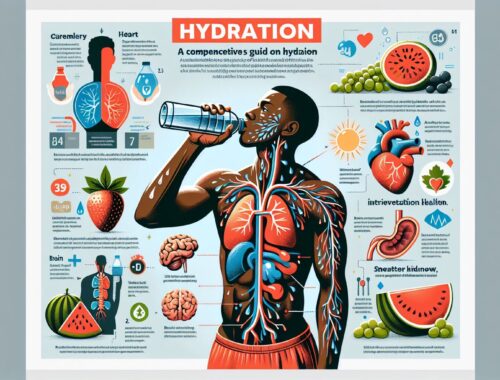
Overall Health and Wellness: A Guide for a Lifetime
Maintaining good health and overall wellness is essential at every stage of life. Whether you are a young adult just starting your journey or an older individual enjoying your golden years, taking care of your body and mind should be a top priority. In this article, we will explore various aspects of overall health and wellness, looking at physical health, mental wellbeing, and alternative medicine to provide you with a comprehensive understanding of what it takes to live a healthy and fulfilling life.
Physical Health: Nurturing Your Body
Caring for your physical health is at the core of overall wellness. Regular exercise, proper nutrition, and preventative care are all crucial elements to maintain a healthy body. Engaging in physical activities not only keeps your body fit but also improves cardiovascular health, builds stronger bones, and boosts your immune system. Aim for at least 150 minutes of moderate-intensity exercise per week, such as brisk walking, swimming, or cycling.
Additionally, it is important to fuel your body with a balanced diet. Fill your plate with a variety of fruits, vegetables, whole grains, lean proteins, and healthy fats. Limit the consumption of processed foods, sugary snacks, and excessive salt. Hydrate yourself adequately by drinking plenty of water throughout the day. Remember, a nourished body is a happy body!
Preventative care is equally essential. Schedule regular check-ups with your healthcare provider to monitor your overall health and catch any potential issues early on. Do not ignore symptoms or discomfort; seeking medical advice promptly can lead to quicker interventions and improved outcomes. Moreover, ensure you are up to date with vaccinations and screenings such as mammograms, colonoscopies, and blood pressure checks.
Mental Wellbeing: Nurturing Your Mind
A healthy body goes hand in hand with a healthy mind. Mental health is just as important as physical health when it comes to overall wellbeing. It affects how we think, feel, and act, influencing our daily lives and relationships. Practicing self-care, managing stress, and seeking support when needed are crucial steps to maintain good mental health.
Self-care activities can vary from person to person. Engage in activities that bring you joy, relaxation, and fulfillment. It could be going for a walk in nature, reading a book, meditating, or spending quality time with loved ones. Taking time for oneself allows you to recharge, reduce stress levels, and improve overall mood.
Stress is a common part of life, but excessive or chronic stress can be detrimental to both physical and mental health. Find healthy ways to manage stress, such as maintaining a regular sleep schedule, practicing deep breathing exercises, or engaging in mindfulness techniques. Consider incorporating activities like yoga or tai chi into your routine, as they have been shown to promote relaxation and reduce stress levels.
Remember, seeking support is a sign of strength, not weakness. If you are experiencing difficulties coping with stress, anxiety, or depression, do not hesitate to reach out to a mental health professional. They can provide guidance, therapy, or counseling tailored to your specific needs, helping you navigate life’s challenges and improve your overall mental wellbeing.
Alternative Medicine: Complementary Approaches
Beyond traditional medical care, alternative medicine offers additional tools to enhance overall health and wellness. Practices such as acupuncture, massage therapy, and herbal supplements have gained popularity in recent years. While evidence supporting their effectiveness varies, many individuals find alternative approaches to be helpful complements to traditional treatments.
Acupuncture, a practice originating from traditional Chinese medicine, involves the insertion of thin needles into specific points of the body. It aims to correct imbalances and promote the body’s natural healing process. Some studies suggest that acupuncture may be beneficial for various conditions, such as chronic pain or nausea.
Massage therapy has been used for centuries to promote relaxation, relieve muscle tension, and reduce stress. It can also aid in pain management and improve circulation. Before considering any alternative treatments, consult with your healthcare provider to ensure they are safe and suitable for your specific needs.
When it comes to herbal supplements, it is important to approach them with caution. While some herbs may have proven health benefits, others can interact with medications or have adverse effects. Always consult with a qualified healthcare professional before incorporating any new supplements into your routine.
Conclusion: Cultivating a Lifelong Commitment
Maintaining overall health and wellness requires a holistic approach that extends throughout your lifetime. Prioritize physical health by exercising regularly, eating nutritious meals, and seeking appropriate medical care. Nurture your mental wellbeing through self-care, stress management, and seeking support when necessary. Consider alternative medicine approaches as complementary tools for enhancing overall health.
Remember, every individual is unique, and what works for one may not work for another. It is vital to listen to your body, be proactive in your healthcare, and make informed decisions based on reliable information. By cultivating a lifelong commitment to your health and wellness, you are empowering yourself to live a fulfilling and vibrant life, regardless of age or circumstances.
You May Also Like

Hydration 101: Properly Hydrating Your Body Before Intense Activity
April 22, 2024
The Path to Optimal Health and Wellness: A Journey for All Ages
January 6, 2024

